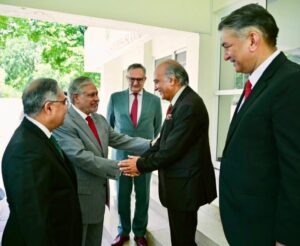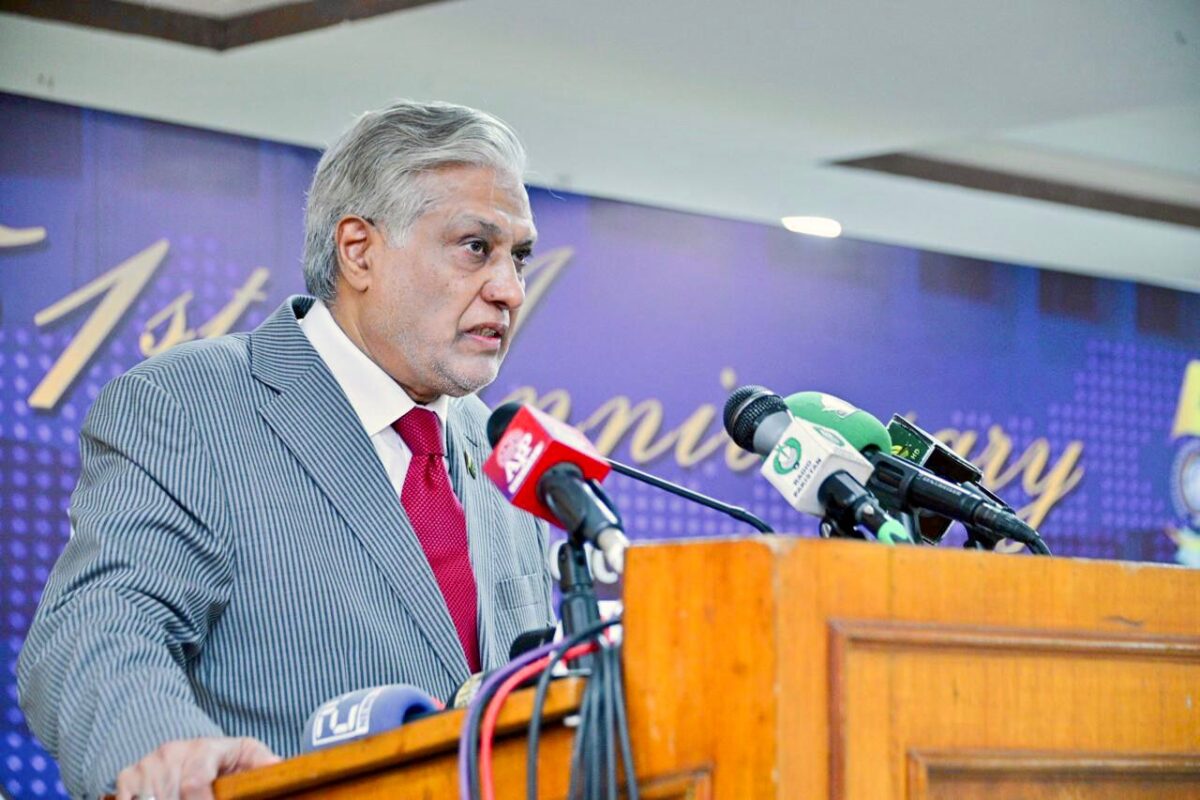Deputy Prime Minister and Foreign Minister Ishaq Dar on Monday emphasized Pakistan’s commitment to maintaining peaceful, cooperative and good neighborly relations, with all countries despite facing challenges and setbacks in certain instances.Speaking at the Institute of Strategic Studies Islamabad’s (ISSI) 51st Foundation Day, he highlighted the importance of dialogue, the avoidance of bloc politics, and adherence to the UN Charter.
Dar stressed Pakistan’s focus on economic development and regional peace, particularly with Afghanistan and India, advocating for stability in South Asia.He also underscored Pakistan’s strong strategic partnership with China, its desire for deeper ties with neighboring and major powers, and its commitment to multilateralism.
The overarching goal was to enhance regional connectivity and economic security through a pivot to geo-economics, he added.Dar stated that despite challenges, Pakistan remained steadfast.He stressed the importance of communication, dialogue, and negotiations to mitigate risks, advocating for a collaborative approach that respected all nations’ interests and aspirations.
The DPM reiterated Pakistan’s opposition to bloc politics, endorsing cooperation over confrontation and commitment to the UN Charter and international law.He noted the profound global transformation highlighted by leaders like Xi Jinping and Olaf Scholz, marking the shift towards a multipolar world order.
“We are living in an increasingly tumultuous and dangerous world, with traditional and new security threats,” he said, adding that Pakistan’s approach focused on a peaceful neighborhood policy and sustainable economic development, emphasizing the link between peace and development.
A peaceful, stable, united, and prosperous Afghanistan was in Pakistan’s interest due to shared history, geography, culture, and music, he added,The deputy prime minister said that since the Taliban takeover in August 2021, Pakistan had cooperated with Afghanistan to avert a humanitarian crisis and support the Afghan people. Pakistan emphasized that Afghan soil must not be used for terrorism against any state and urged Afghan authorities to address its concerns, he added.
Dar said a peaceful, stable Afghanistan would benefit both countries and promote prosperity in Central Asia and beyond.He said Pakistan sought good relations with India based on mutual respect, sovereign equality, and a peaceful resolution of the Jammu and Kashmir dispute, rejecting any unilateral approaches or attempts at hegemony.
“We will maintain strategic stability in South Asia and respond decisively to any ill-considered military actions by the Hindutva-driven government in New Delhi,” he added.Regarding the new term of BJP-led NDA government in India, he called for reflection on India-Pakistan relations and regional issues.
The DPM stated that India’s unilateral actions on August 5, 2019 in Illegally Occupied Jammu and Kashmir, harmed bilateral relations, and urged India to take steps to create an environment conducive to meaningful dialogue.
He urged India to end its smear campaign, cease state-sponsored terrorism in Pakistan, and take concrete steps for positive relations.South Asian nations must address poverty and low human development rankings, Dar added.He noted that South Asian Association for Regional Cooperation, (SAARC) remained stalled due to one member state’s obstinacy.
The DPM emphasized Pakistan’s strategic partnership with China as pivotal to its foreign policy, addingChina Pakistan Economic Corridor (CPEC) was trans formative, boosting Pakistan’s economy and regional prosperity.The recent visit of Prime Minister Shehbaz Sharif to China reaffirmed the strategic importance, both countries placed on the relationships and CPEC, the DPM added.
He said upon completing 10 years of CPEC, Pakistan agreed to pursue its upgraded version, focusing on industrialization, digitalization, green initiatives, agriculture, and people-to-people exchangesEnsuring the safety of Chinese personnel and projects, Pakistan-China relations will continue to benefit both nations.
Pakistan aims for deeper partnerships with Iran, Gulf nations, Turkiye, Central Asian States, and Azerbaijan, prioritizing trade, investment, and regional connectivity through the Special Investment Facilitation Council (SIFC).Maintaining a stable relationship with the United States was crucial, he said, adding that along with fostering ties with major powers like Russia, the European Union, Japan, and ASEAN to enhance economic security amid global geopolitics.
Pakistan’s ‘pivot to geo-economics’ leverages its strategic location to build development partnerships with key global actors.Pakistan’s upcoming UN Security Council membership for 2025-26 underscored its commitment to international peace and security, he added.
Earlier, Director General of ISSI Ambassador Sohail Mehmood highlighted the Institute’s performance saying that it had increased collaboration with international partners.ISSI has organized 130 events and published over150 issued briefs during July 2023 to June 2024. ISSI was also Introducing three new books and three special reports on Monday, he added.









